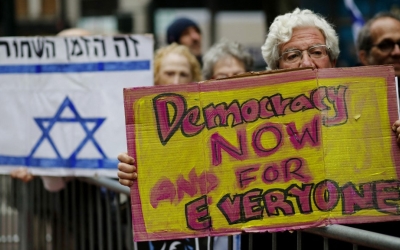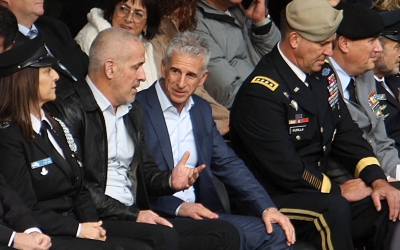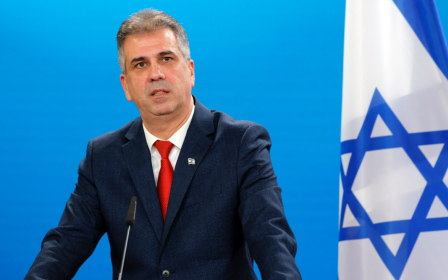Israelis continue protests as judicial reform advances

Tens of thousands of Israeli protesters took to the streets of Tel Aviv and elsewhere on Saturday protesting against reforms advanced by the ruling coalition they say threaten the country's democratic character.
Later on Saturday, Israeli Prime Minister Benjamin Netanyahu was admitted to hospital with apparent dehydration after a coastal break during a heatwave, delaying the weekly cabinet meeting.
Saturday's rallies, the 28th since the reform agenda was unveiled in January, come days after parliament approved in its first reading a bill that would reduce the "reasonability" clause, through which the judiciary can strike down government decisions.
The proposals would also give the government a greater say in the appointment of judges.
"This is a battle for the country. We want to keep Israel democratic, and the dictatorship laws won't pass here," protester Nili Elezra, 54, told AFP.
To her, passing the laws would harm Israel's financial and global standings.
"Things will be bad. People are already leaving, money is being lost, investors are fleeing, the world doesn't want to talk to us, nobody is happy with what's going on here," she said.
Following stiff opposition and growing international criticism - including from US President Joe Biden - Netanyahu ordered a "pause" in March to allow for talks on the proposals.
That cross-party dialogue collapsed last month.
'We have to block them'
To Elad Ziv, the upcoming weeks were crucial in stopping the legal reform.
"We have two and a half weeks to the end of parliament's summer session and we have to block them, otherwise Israel will become a worse place," the 45-year-old programmer said.
And while the weekly demonstrations did not seem to hamper the coalition's legislation, they did afford support to members of the technology sector and military reservists opposing the government's ambitions.
"We do see the protest working in supporting people who are fighting," he said.
"The numbers make a difference."
Protests have swept Israel for the last six months, as hundreds of thousands of demonstrators have railed against Netanyahu's plans, denouncing them as a coup.
The political crisis has pitted Netanyahu’s far-right government against the country’s civil society, academic and business elite, as well as former government ministers and military figures.
The American Jewish Committee, a powerful advocacy group in the US, expressed concern following the passing of the latest piece of legislation and said it supported efforts to find a compromise and include opposition voices.
The government argues that judicial reform is necessary to ensure a better balance of power.
After unsuccessful talks with the opposition following weeks of mass protests earlier this year, the government was on the offensive once again last week.
Corruption charges
Netanyahu is on trial for corruption, and the judicial reforms could enable him to evade conviction or see his case dismissed. Since being indicted in 2019, Netanyahu has publicly railed against the justice system, calling it biased against him.
Israel has no constitution and there is little separation between the executive and legislative branches, as governments nearly always hold a majority in parliament, the Knesset.
This has historically meant the Supreme Court is the most effective check on government power.
In January, dozens of prominent American legal scholars from several leading law schools signed a public statement voicing deep concerns about the proposed changes to Israel's judicial system.
In the statement, more than 70 US law professors said the proposed reforms "will seriously weaken the independence of the judiciary, the separation of powers, and the rule of law in Israel".
Netanyahu taken to hospital
As the protests raged, Netanyahu was admitted to hospital with apparent dehydration after a coastal break during a heatwave, delaying the weekly cabinet meeting, even though he declared himself fit and well.
Netanyahu's office said the 73-year-old was admitted to Sheba Hospital, close to his private residence, after experiencing dizziness, and would stay there overnight.
In a video from hospital, a smiling Netanyahu said he had been taken ill on holiday on Friday at the Sea of Galilee in temperatures hitting 38C.
"Thank God, I feel really well," he said, according to Reuters.
Netanyahu's office said that Sunday's scheduled cabinet meeting would instead be held on Monday.
Netanyahu's office said he was admitted on his physician's recommendation after complaining of "light dizziness".
"I wish the prime minister a full recovery and good health," tweeted Yair Lapid, the centrist leader of the opposition.
In Washington, a spokesperson for the White House National Security Council said: "We wish him a speedy recovery."
In early October, Netanyahu was taken ill during the Jewish fast of Yom Kippur and was also briefly hospitalised.
Middle East Eye propose une couverture et une analyse indépendantes et incomparables du Moyen-Orient, de l’Afrique du Nord et d’autres régions du monde. Pour en savoir plus sur la reprise de ce contenu et les frais qui s’appliquent, veuillez remplir ce formulaire [en anglais]. Pour en savoir plus sur MEE, cliquez ici [en anglais].






